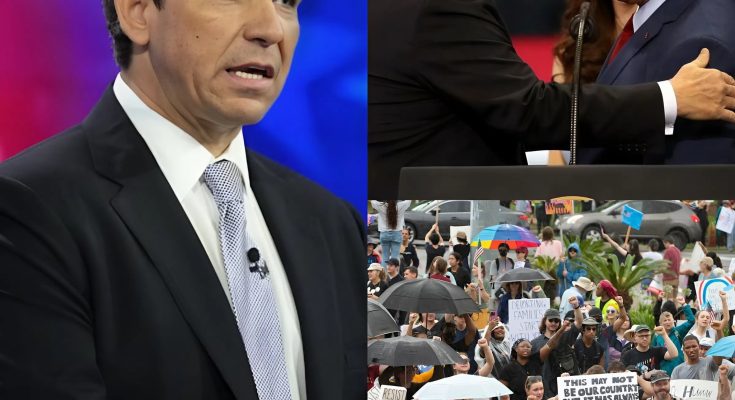A political uproar has erupted in Florida following Governor Ron DeSantis’s assertion that residents may drive through protesters obstructing the road if they feel their lives are in jeopardy. Democrats and human rights organizations are demanding his immediate removal.
His statement referenced Florida’s HB1 “anti-riot” law, enacted in 2021, which provides civil immunity to drivers who injure or kill someone while escaping from a riotous crowd blocking the road.
Under the law:
Drivers may be granted civil immunity if they injure someone while fleeing a situation classified as a “riot.”
However, the law does not protect drivers from criminal prosecution — they can still face charges of assault, manslaughter, or other criminal offenses.
Legal protection hinges on whether the driver had a “reasonable belief” that their life was in danger.
Legal experts contend that DeSantis misrepresented the law’s limitations, oversimplifying what it truly permits.
Following DeSantis’s statement:
Numerous Democratic lawmakers in Florida and nationwide have called for his removal or a legal investigation, citing the incitement of violence.
Civil rights organizations such as the ACLU and NAACP condemned the statement, warning that it threatens lawful protest and could incite deadly actions.
Activists branded it as “legalized vehicular violence” under the pretext of self-defense.
Can drivers run over protesters?
Only under extreme self-defense claims — not automatically legal
DeSantis’s statement
Oversimplifies and may mislead public understanding
The Importance of This Issue
Rights to Protest versus Self-Defense: The distinction between ensuring public safety and suppressing dissent is becoming increasingly unclear.
A Dangerous Precedent: Should DeSantis’s interpretation gain traction, it is likely that other states may follow suit with similar positions.
Political Maneuvering: The governor appears to be appealing to hardline voters in anticipation of the 2026 elections — but at what potential cost?
Concluding Thoughts
Although Florida law permits limited civil immunity in instances of self-defense during riots, Governor DeSantis’s remarks are facing criticism for potentially promoting extreme actions. As both legal and political pressures escalate, this situation could evolve into one of the most significant constitutional controversies in Florida in recent years.



